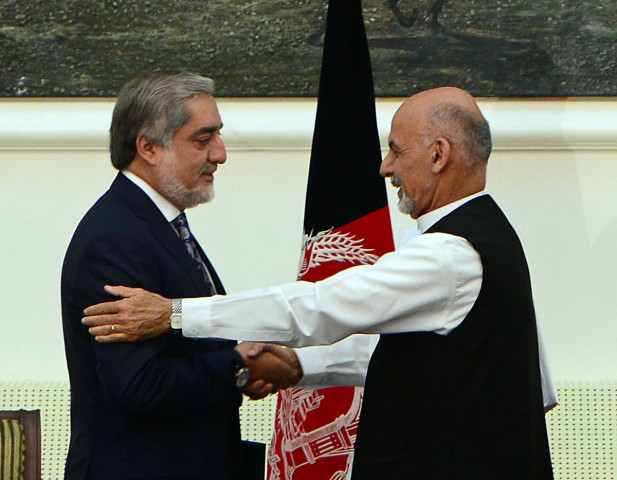Pakistan hails Afghan power-sharing pact
Terms it vital for all Afghan leaders to work together constructively in the supreme interest of their people

The new arrangement is in line with the power-sharing deal brokered by the United States and gives both Ghani and Abdullah an equal share in the cabinet. PHOTO: AFP
"At this critical juncture, it is vitally important that all Afghan leaders work together constructively in the supreme interest of the Afghan people and help bring lasting peace and stability to the country affected by decades of violence and conflict," said a statement issued by the Foreign Office.
“This is imperative also for being able to effectively respond to the formidable challenges posed by Covid-19 pandemic,” it added.
It further said the US-Taliban Peace Agreement created a historic opportunity, which must be seized by all Afghan stakeholders to advance the goals of peace and reconciliation in Afghanistan.
It is critical that the Intra-Afghan negotiations commence at the earliest, culminating in a comprehensive and inclusive political settlement in Afghanistan.
"All Afghan parties must honour their respective commitments, work with perseverance and sense of common purpose, and also guard against the machinations of any spoilers, from within and without."
While reaffirming abiding solidarity with the people of Afghanistan, Pakistan reiterated its commitment to continue to support a peaceful, stable, united, democratic and prosperous Afghanistan, at peace with itself and its neighbours.
Sources said the appointment of Abdullah as head of the peace council was a positive development since the former chief executive adopted a pragmatic approach than his political rival Ghani on seeking peace with the Taliban.
Another visible difference between Ghani and Abdullah is that unlike the Afghan president, Abdullah had stopped giving hostile statements or blaming Pakistan for the instability in his country.
Abdullah's "mature approach" has been attributed to Pakistan's engagement with all stakeholders in Afghanistan unlike the past where Islamabad ignored non-Pashtun players in the war-torn country.
The power sharing deal may also revive the bilateral engagement between Pakistan and Afghanistan.
The Afghanistan-Pakistan Action Plan for Peace and Solidarity (APAPPS), a bilateral forum was set up in May 2018 as part of efforts not only to remove mistrust but also improve ties between the two neighbours.
The two countries were discussing dates for the next session of APAPPS but internal differences delayed the meeting.
Afghan President Ashraf Ghani and his political rival Abdullah Abdullah on Sunday agreed on a power sharing deal, ending months’ long political uncertainty and renewing hopes for crucial talks between Afghan government and the Taliban.
The lingering stalemate between Ghani and Abdullah following the last September's controversial presidential elections was one of the main reasons the peace process could not move forward despite landmark deal signed between the US and Afghan Taliban on February 29.
As part of the power sharing deal, Ghani would continue as President while Abdullah would now lead a high peace council mandated to hold talks with the Taliban.
Upset and angered by the internal wrangling, the US in March decided to cut $1 billion financial assistance, accusing both Ghani and Abdullah for working against the interest of peace.
But Zalmay Khalilzad, the chief US diplomat for Afghanistan, continued to make overt and covert efforts not only to keep the peace process on track but also convince Ghani and Abdullah to set aside their differences in the interest of Afghanistan.
Soon after Ghani and Abdullah signed the accord, Ambassador Khalilzad welcomed the move and hoped that this would lead to sustainable peace in the war-torn country.
The immediate challenge for Abdullah, who is now leading peace efforts from Afghan side, is to ensure the implementation of prisoners swap agreement.
Under US-Taliban deal, Afghan government was to release 5,000 Taliban prisoners while the insurgents were also set to free 1,000 Afghan security personnel.
The prisoners exchange was supposed to take place within days of February 29 deal but Ghani's reluctance to free the prisoners in one go delayed the process.
Recently, the two sides did exchange some prisoners but Taliban are adamant that they would only enter into intra-Afghan dialogue once their 5,000 colleagues are freed.
Diplomatic sources and officials say India was behind encouraging Ghani not to free Taliban prisoners, something that prompted Khalilzad to visit India recently and deliver a clear message of not spoiling the peace efforts.
India has been apparently opposing the peace deal on the grounds that any legitimacy given to Taliban would erode its influence or sidelines elements which it cultivated over the years to pursue its strategic objectives.
But the US pressure seemed worked as Ghani finally agreed to share power arrangement with Abdullah.





1724319076-0/Untitled-design-(5)1724319076-0-208x130.webp)













COMMENTS
Comments are moderated and generally will be posted if they are on-topic and not abusive.
For more information, please see our Comments FAQ